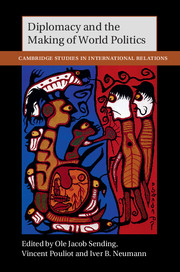Book contents
- Frontmatter
- Contents
- Contributors
- Acknowledgments
- Introduction
- Part I Making of international institutions
- Part II Making international cooperation
- Part III Diplomacy as a contested terrain
- 7 Diplomacy as economic consultancy
- 8 US military diplomacy in practice
- 9 Diplomats and humanitarians in crisis governance
- Conclusion: Relationalism or why diplomats find international relations theory strange
- Bibliography
- Index
- Cambridge Studies in International Relations
9 - Diplomats and humanitarians in crisis governance
from Part III - Diplomacy as a contested terrain
Published online by Cambridge University Press: 05 September 2015
- Frontmatter
- Contents
- Contributors
- Acknowledgments
- Introduction
- Part I Making of international institutions
- Part II Making international cooperation
- Part III Diplomacy as a contested terrain
- 7 Diplomacy as economic consultancy
- 8 US military diplomacy in practice
- 9 Diplomats and humanitarians in crisis governance
- Conclusion: Relationalism or why diplomats find international relations theory strange
- Bibliography
- Index
- Cambridge Studies in International Relations
Summary
Introduction
The past two decades of research on globalization is replete with claims about the power of non-state actors and the implied demise or transformation of diplomacy. Claims about the transformation of diplomacy are not new, however. In 1908, for example, a press officer at the German Foreign Office opined that times were gone when “the fates of nations were decided in small, closed circles of courtly and diplomatic individuals … the public opinion of the nations has acquired a degree of influence on political decisions previously unimaginable.” This serves as a useful reminder that the question of the transformation of diplomacy or of diplomats’ loss of core tasks is not only an old one but one that begets a set of more fundamental questions: What characterizes diplomacy as a social practice? How does diplomacy relate to and possibly shape the operations of non-diplomatic actors? What is at stake in bringing some event or phenomenon within the remit of diplomacy?
I seek to answer these questions by analyzing the relationship between diplomacy and humanitarian action. My answer is that it is not really possible to understand the character of humanitarian action – and the ideology of humanitarianism – without analyzing how diplomacy defines the conditions of possibility for its particular form and its mode of operation. As such, diplomatic practices reproduce the system within which humanitarian action operates and therefore structure world politics in fundamental yet often unacknowledged ways.
I focus on the relationship between humanitarian action and diplomacy for three principal reasons. First, humanitarian action has expanded considerably during the past two decades, and diplomats and humanitarian actors engage one another on a range of issues that are high on the international agenda. Examples include the unfolding conflict in Syria, debates about “humanitarian space” in Afghanistan, and the invocation of the humanitarian principle of “protection of civilians” in the intervention in Libya and Cote D'Ivoire. Second, whereas humanitarians invoke claims to universality – “humanity” – and thus seek to transcend territoriality, diplomats represent territorial units. This makes the exploration of their relationship important as a tool to unearth the distinctive features of both.
- Type
- Chapter
- Information
- Diplomacy and the Making of World Politics , pp. 256 - 283Publisher: Cambridge University PressPrint publication year: 2015
- 13
- Cited by

